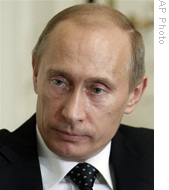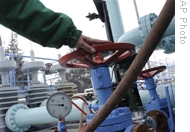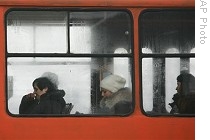VOA标准英语2009年-Hungary, Eastern Europe Face Cold Without Russi(在线收听)
Natural gas deliveries to Europe, via Ukraine, came to a halt Wednesday.
 |
| Russian Prime Minister Vladimir Putin in St. Petersburg, 07 Jan 2009 |
Russian Prime Minister Vladimir Putin made that decision after being told Ukraine was stealing natural gas destined for Europe to make up for shortfalls after Russia closed the taps to its neighbor because of a pricing dispute.
During talks Thursday, officials from the two nations said they were willing to start pumping gas to Europe and would accept having monitors check on the gas flow - but they were less confident about solving the root causes of the dispute.
This worries former Soviet satellite states such as Hungary that are heavily dependent on Russian energy.
Large firms and factories have been ordered to use less natural gas amid fears reservoirs could run out. Hungarian Energy Minister Csaba Molnar says the government is closely monitoring the situation and the negotiations between Ukraine and Russia. He adds that if there will be a lack of natural gas deliveries Hungary may have to order the government's first level category of consumers, meaning large companies and factories, to cease their production.
 |
| Worker checks natural gas line pressure in Hungary |
Gas reductions come at an already difficult time for companies during the worst economic crisis in decades.
One example is the meat processing plant 'Kometa '99' in the Hungarian town of Kaposvar, about 190 kilometers southwest of Budapest. Its deputy director Tibor Hollosy suggests that pigs in his neighborhood will live a bit longer.
He says they still have some gas and his company cannot stop production completely. But Hollosy says the firm is already considering reducing the number of pigs slaughtered. He adds the company is also considering how to use the production facility for other activities.
Thousands of Hungarian residents in the nearby area of Komlo, a former mining town already suffering from recession and mine closures are feeling the effects of the gas shortage.
Pensioner Imre Deak is among the people in the region anxiously looking at their heating systems in rundown apartments.
He says when he woke up it felt cooler than usual in his room. Deak says his heating system does not work well. He says his boiler, which he needs for heating, has difficulty starting because of low gas pressure.
Despite its difficulties, Hungary's Prime Minister Ferenc Gyurcsany says his country will try to sell two million cubic meters of natural gas daily to neighboring Serbia, where supplies are running low amid freezing conditions.
In Serbia's northern province of Vojvodina, which has a significant Hungarian minority, several towns have been unable to make the changeover from gas to crude oil. Hundreds of thousands of people are now without regular heating as temperatures have dropped.
 |
| People ride in a unheated tram in effort to save on electric power in Bulgarian capital, Sofia, 8 Jan. 2009 |
There have been similar reports in other Eastern European and Balkan countries, including in Bulgaria where dozens of schools have closed because of the sub-zero temperatures. In Bosnia, officials say thousands also spent the night without gas. Most electrical heaters in the capital Sarajevo have been sold.
More than a dozen people have also frozen to death in Eastern Europe, mainly in Poland, and Romania. Spokesman Radek Honzak of the European Union's current president, the Czech Republic, says the bloc is closely monitoring the situation.
"This is a serious problem. And we need to find a solution immediately. Or rather the two sites of the dispute need to find a solution and immediately restore full supplies of gas into the Europe Union according to existing commitments," he said.
Whatever the outcome, nothing will change for tens of thousands of homeless people in Eastern Europe, including workers of closed factories, for whom there is not always a shelter. They already reconciled themselves with living in harsh winter conditions.